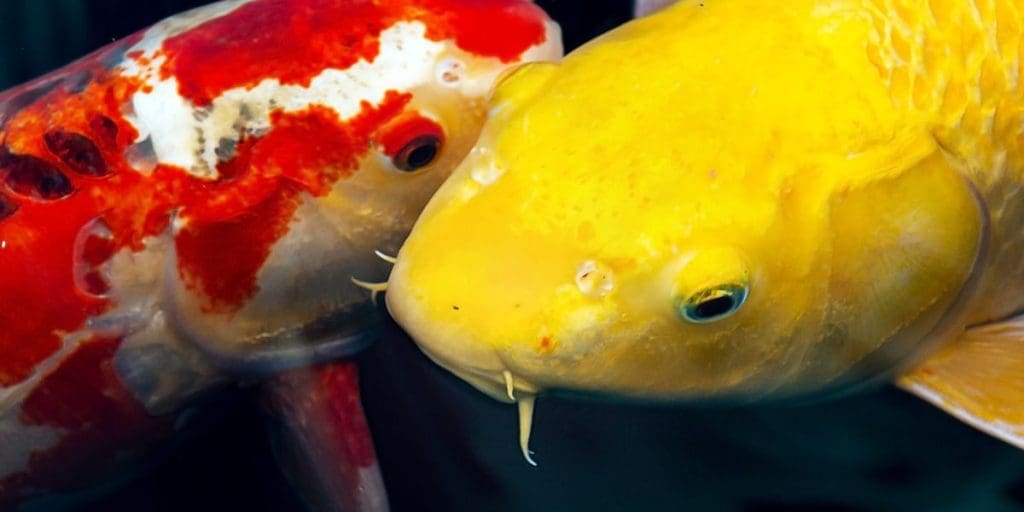When it comes to maintaining a beautiful and healthy koi pond, choosing the right filter is crucial. A good filter will not only keep the water clean and clear but also ensure that your fish remain healthy and happy. But with so many options available on the market, it can be overwhelming to decide which one is the best fit for your pond.
One important factor to consider when choosing a koi pond filter is the size of your pond and the number of fish you have. A filter that is too small for your pond or cannot handle the waste produced by your fish will not be effective in keeping the water clean. Additionally, you will want to consider the type of filter you need, whether it be a mechanical filter, biological filter, or a combination of both. Another factor to consider is the installation process and whether you want an above-ground or below-ground filter.
What Really Matters
When it comes to selecting the best koi pond filter, there are a few key takeaways to keep in mind. Here are some important points to consider:
1. Size Matters
The size of your pond is a crucial factor to consider when choosing a filter. A filter that is too small for your pond will not be able to handle the amount of waste produced by your koi. On the other hand, a filter that is too large may be unnecessary and may end up costing you more money than you need to spend. Make sure to choose a filter that is appropriate for the size of your pond.
2. Filtration System
The type of filtration system you choose is also important. There are three main types of filtration systems: mechanical, biological, and chemical. Mechanical filters remove debris and particles from the water, while biological filters use beneficial bacteria to break down waste. Chemical filters use additives to remove impurities from the water. A combination of all three types of filters is usually the most effective.
3. Pump Capacity
The pump capacity of your filter is another important factor to consider. Your filter should be able to turn over the entire volume of your pond at least once every two hours. This means that if you have a 1,000-gallon pond, your filter should have a pump capacity of at least 500 gallons per hour.
4. UV Clarifier
A UV clarifier can also be a useful addition to your filtration system. UV clarifiers use ultraviolet light to kill harmful bacteria and algae in the water. This can help to keep your pond water clear and healthy.
5. Maintenance
Finally, it is important to consider the maintenance requirements of your filter. Some filters require more maintenance than others, so make sure to choose a filter that you will be able to maintain properly. Regular cleaning and maintenance will help to ensure that your filter is working effectively and keeping your koi healthy.
Understanding Koi Pond Filters
If you’re a koi pond owner, you know how important it is to keep the water clean and healthy for your fish. One of the key components of a healthy koi pond is a good filtration system. A koi pond filter is responsible for removing debris, ammonia, nitrites, and nitrates from the water. In this section, we’ll take a closer look at koi pond filters and what you need to know to choose the best one for your pond.
Types of Koi Pond Filters
There are several types of koi pond filters available on the market. The most common types are:
- Mechanical Filters: These filters physically remove debris and particles from the water. They often use a foam or sponge to trap the debris.
- Biological Filters: These filters use beneficial bacteria to break down harmful substances in the water, such as ammonia and nitrites. They typically use a media with a large surface area for the bacteria to colonize.
- UV Filters: These filters use ultraviolet light to kill bacteria, viruses, and parasites in the water.
- Combination Filters: These filters combine mechanical, biological, and UV filtration in one unit.
Factors to Consider When Choosing a Koi Pond Filter
When choosing a koi pond filter, there are several factors to consider:
- Pond Size: Choose a filter that is rated for the size of your pond.
- Fish Load: If you have a lot of fish in your pond, you’ll need a filter with a higher capacity.
- Flow Rate: Make sure the filter has a flow rate that is appropriate for your pond size.
- Maintenance: Consider how easy the filter is to clean and maintain.
- Budget: Koi pond filters can range in price from a few hundred dollars to several thousand dollars. Determine your budget before you start shopping.
Making the Right Decision
Choosing the right koi pond filter is essential for maintaining a healthy and clean pond for your fish. Consider the size of your pond, the number of fish you have, the flow rate of the filter, and your budget when making your decision. With the right filter, your koi will thrive and your pond will be a beautiful addition to your backyard.
Types of Koi Pond Filters
When it comes to koi pond filters, there are three main types: mechanical, biological, and chemical. Each type serves a different purpose in keeping your pond water clean and clear.


JOIN OUR COMMUNITY AND GET A FREE E-BOOK
Mechanical Filters
Mechanical filters are designed to remove large debris from your pond water. They work by physically trapping dirt, leaves, and other debris as the water flows through the filter media. Mechanical filters are typically the first line of defense in a pond filtration system.
Some common types of mechanical filters include:
- Skimmers: These filters are installed on the surface of the pond and use a basket or net to catch floating debris.
- Sieves: Sieves are used to remove larger particles from the water before it enters the biological filter.
- Foam filters: Foam filters are made of a porous material that traps debris as water passes through it.
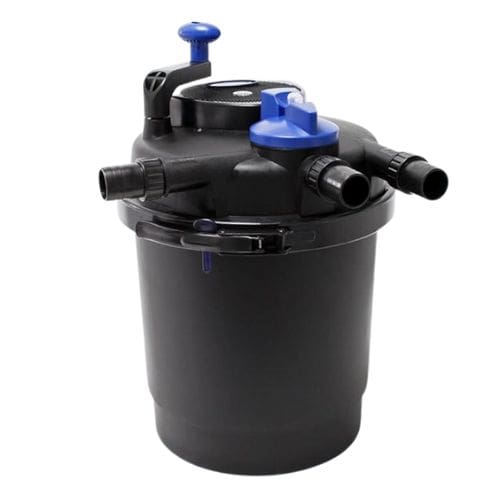

Sun Sun Pressurized Filter
Includes UV Clarifier
Biological Filters
Biological filters are designed to remove harmful toxins from your pond water. They work by providing a surface area for beneficial bacteria to colonize. These bacteria break down ammonia and other harmful substances into less harmful compounds.
Some common types of biological filters include:
- Bead filters: Bead filters use plastic beads as a filter media to provide a large surface area for bacteria to grow.
- Moving bed filters: Moving bed filters use plastic media that moves around in the filter to provide aeration and a large surface area for bacteria to grow.
- Submerged filters: Submerged filters are installed underwater and use a filter media to provide a surface area for bacteria to grow.
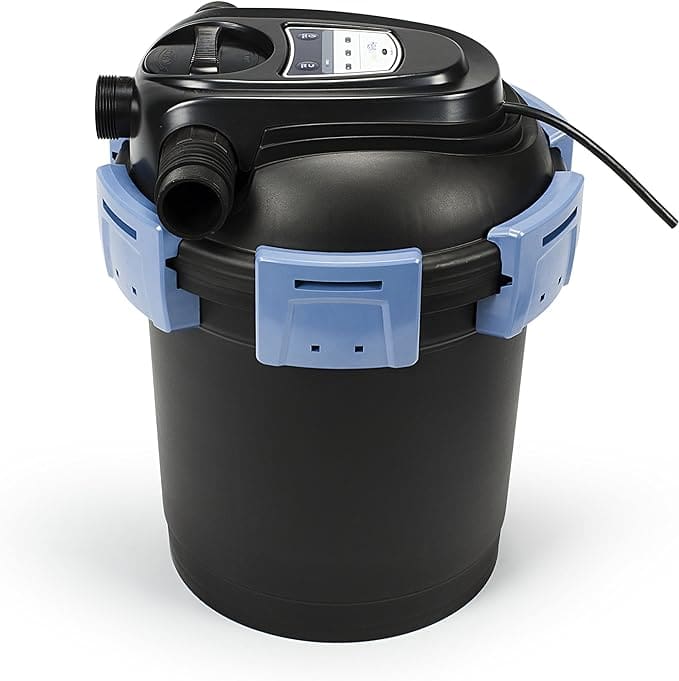

UltraKlean 2000 Gallon Biological Pressure Filter
Includes UV Clarifier
Chemical Filters
Chemical filters are designed to remove specific pollutants from your pond water. They work by using activated carbon or other chemical media to absorb or neutralize harmful substances.
Some common types of chemical filters include:
- Carbon filters: Carbon filters use activated carbon to remove impurities from the water.
- Zeolite filters: Zeolite filters use a natural mineral to remove ammonia from the water.
- Ion exchange filters: Ion exchange filters use resin beads to remove specific ions from the water.
Overall, the best koi pond filter for you will depend on the size of your pond, your budget, and your specific filtration needs. By understanding the different types of filters available, you can make an informed decision about which one is right for your pond.
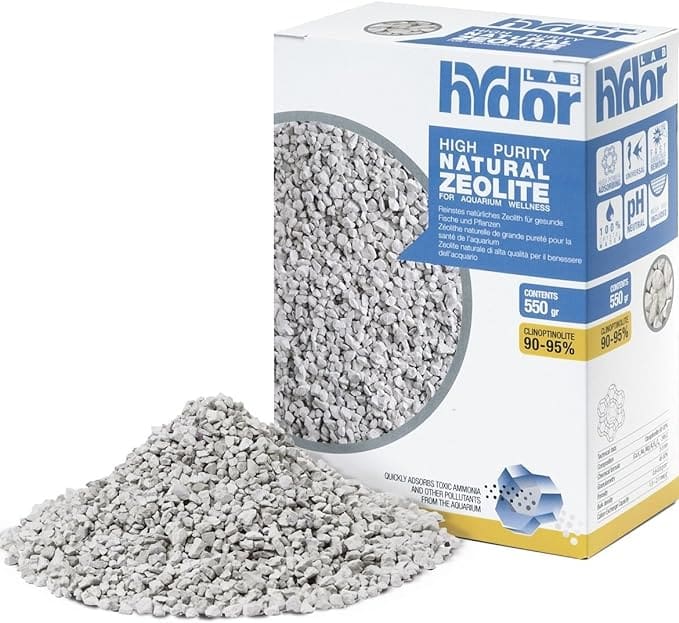

Hydor Professional External Canister , ZeoliteFilter Media
Key Features of a Good Koi Pond Filter
When it comes to keeping your koi pond clean and healthy, choosing the right filter is crucial. A good koi pond filter should have several key features that ensure it can effectively handle the size of your pond, is easy to maintain, and is durable enough to last for years. Here are the three most important features to look for when choosing a koi pond filter.
Size Compatibility
The first thing to consider when choosing a koi pond filter is its size compatibility. You’ll want to make sure that the filter you choose is suitable for the size of your pond and the number of koi you have. A filter that is too small for your pond will not be able to keep up with the waste produced by your koi, leading to poor water quality and potentially harmful conditions for your fish.
On the other hand, a filter that is too large for your pond may be unnecessarily expensive and difficult to maintain. Consider the size of your pond, the number and size of your koi, and the flow rate of your pond’s water when choosing a filter.
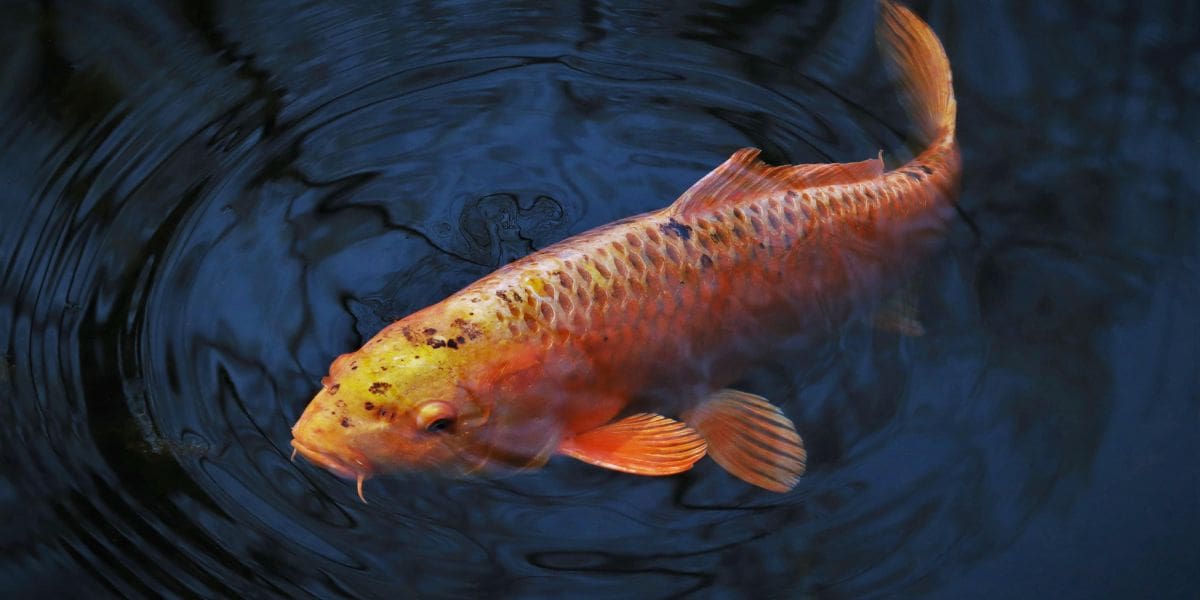

Ease of Maintenance
Another important feature of a good koi pond filter is ease of maintenance. Your filter will need to be cleaned and maintained regularly to keep it functioning properly. Look for a filter that is easy to access and clean, with removable components that can be easily replaced if needed.
Some filters may also have automatic cleaning features or self-cleaning mechanisms, which can save you time and effort in maintaining your pond. Consider your own maintenance preferences and abilities when choosing a filter.
Durability
Finally, a good koi pond filter should be durable enough to last for years. Your filter will be exposed to water, sunlight, and potentially harsh weather conditions, so it’s important to choose a filter that is made from high-quality materials and designed to withstand the elements.
Look for filters that are made from durable materials like PVC or stainless steel, with components that are designed to resist corrosion and wear. A filter that is built to last will save you money and hassle in the long run.
In summary, a good koi pond filter should be sized appropriately for your pond, easy to maintain, and durable enough to last for years. By considering these key features, you can choose a filter that will keep your koi pond clean and healthy for years to come.
Top Rated Koi Pond Filters
When it comes to koi pond filters, there are many options available on the market. But which one is the best for you? We’ve researched and compiled a list of some of the top-rated koi pond filters to help you make an informed decision.
Lifegard Aquatics Trio Pond Filter
The Lifegard Aquatics Trio Pond Filter is an excellent choice for those who are looking for a complete filtration system for their koi pond. This filter comes with everything you need to filter a 2,000-gallon pond effectively, including mechanical, biological, and chemical filtration. It is also extremely affordable, making it a great option for those on a budget.
OASE BioSmart 5000 Pond Filter
The OASE BioSmart 5000 Pond Filter is another great option for those looking for a complete filtration system. It features a unique flow-through design that ensures maximum exposure of the water to the filter media, resulting in crystal-clear water. This filter also comes with a built-in cleaning indicator that lets you know when it’s time to clean the filter.
Aqua Ultraviolet Ultima II 1000 Filter
The Aqua Ultraviolet Ultima II 1000 Filter is a great choice for those with smaller ponds. This filter is designed for ponds up to 1,000 gallons and combines the benefits of both mechanical and biological filtration. It also features a unique backwash system that makes cleaning the filter a breeze.
TetraPond Bio-Active Pressure Filter
The TetraPond Bio-Active Pressure Filter is another great option for those with smaller ponds. This filter is designed for ponds up to 1,800 gallons and features a unique bio-activator media that provides both mechanical and biological filtration. It also comes with a built-in UV clarifier that helps to keep your water crystal-clear.
Pond Boss FM002P Filter Kit
The Pond Boss FM002P Filter Kit is a great option for those on a tight budget. This filter kit includes both a mechanical and biological filter, as well as a built-in UV clarifier. It is designed for ponds up to 500 gallons and is easy to install and maintain.
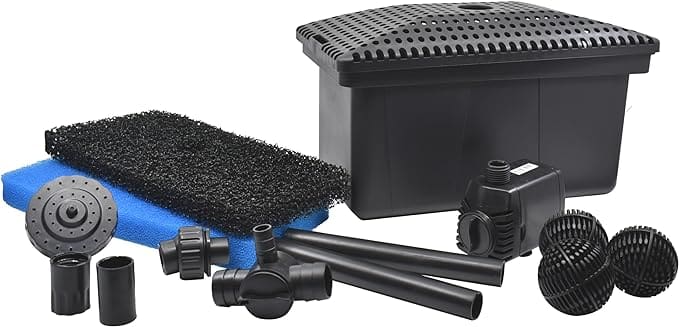

POND BOSS Filter Kit with Pump
Choosing the right koi pond filter can be a daunting task, but with the right information, you can make an informed decision. Consider your pond size, the number of fish you have, and your budget when choosing a filter. With any of the above options, you can be confident that you’re choosing a top-rated koi pond filter that will keep your pond clean and healthy.
How to Choose the Best Koi Pond Filter
When it comes to choosing the best koi pond filter, there are a few important factors to consider. In this section, we’ll discuss the three main factors that you should keep in mind when choosing a filter for your koi pond: pond size, fish load, and budget.
Pond Size
The size of your pond is one of the most important factors to consider when choosing a koi pond filter. A filter that is too small for your pond will not be able to keep up with the amount of waste produced by your fish, which can lead to poor water quality and sick fish.
To determine the right filter size for your pond, you should consider the total volume of water in your pond. As a general rule of thumb, your filter should be able to process the entire volume of your pond at least once per hour. So, if you have a 1,000 gallon pond, you should look for a filter with a minimum flow rate of 1,000 gallons per hour.
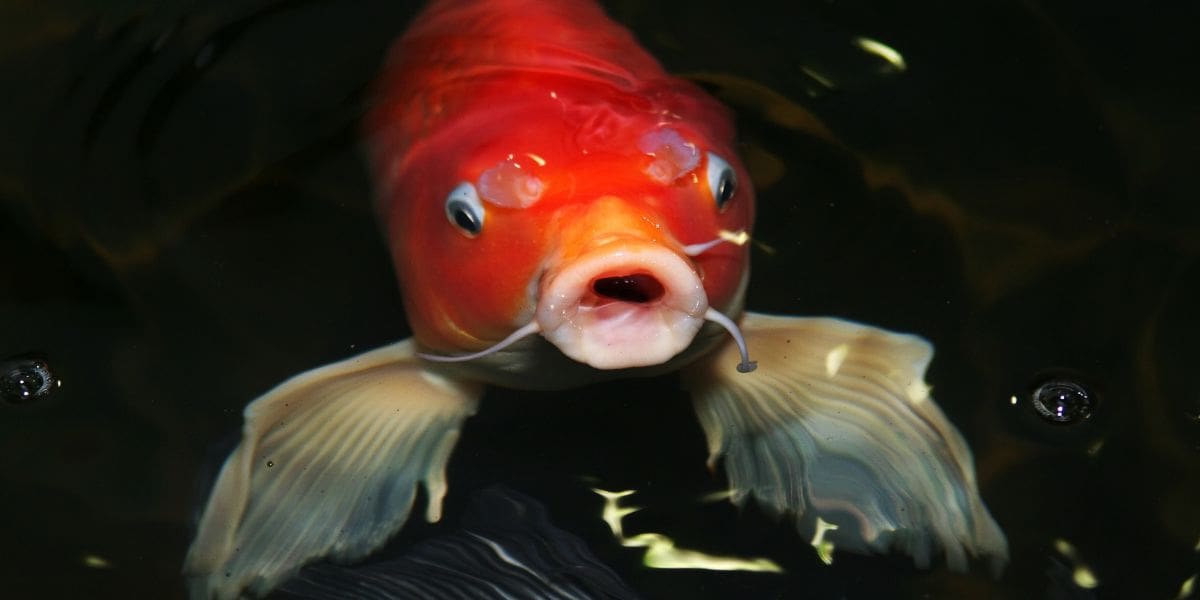

Fish Load
The number of fish in your pond is another important factor to consider when choosing a koi pond filter. The more fish you have, the more waste they will produce, which means you will need a larger filter to keep up with the demand.
As a general rule of thumb, you should aim for a filter that can handle at least 1 pound of fish per 10 gallons of water. So, if you have a 1,000 gallon pond and 10 koi fish, you should look for a filter that can handle at least 10 pounds of fish.
Budget
Finally, you should consider your budget when choosing a koi pond filter. While it’s important to invest in a high-quality filter that can keep your fish healthy, you don’t want to overspend and break the bank.
There are many different types of filters available at different price points, so it’s important to do your research and find a filter that meets your needs and fits within your budget. Keep in mind that a higher price does not always mean a better filter, so be sure to read reviews and compare features before making a decision.
In summary, when choosing the best koi pond filter, you should consider the size of your pond, the number of fish you have, and your budget. By taking these factors into account, you can find a filter that will keep your pond clean and your fish healthy.


Proper Maintenance of Koi Pond Filters
Maintaining your koi pond filter is essential to ensure your koi fish are healthy and happy. Here are some tips on how to properly maintain your koi pond filter:
- Clean the filter media regularly: The filter media is where the beneficial bacteria live, which helps break down harmful toxins in the water. Over time, debris and waste can accumulate in the filter media, reducing its effectiveness. It’s important to clean the filter media regularly to ensure it’s working properly.
- Replace filter media when necessary: Over time, filter media can become clogged or worn out, reducing its effectiveness. If you notice that your filter media is not working as well as it used to, it may be time to replace it.
- Check the water flow: The water flow through the filter is important to ensure that all the water in your pond is being filtered properly. If the water flow is too slow, it may indicate that the filter is clogged and needs to be cleaned. If the water flow is too fast, it may indicate that the filter is not large enough for your pond.
- Check the pump: The pump is responsible for moving water through the filter. If the pump is not working properly, the water flow through the filter will be reduced, which can lead to poor water quality. It’s important to check the pump regularly to ensure it’s working properly.
- Check the plumbing: The plumbing that connects the pump to the filter can become clogged or damaged over time, reducing the water flow through the filter. It’s important to check the plumbing regularly to ensure it’s working properly.
By following these tips, you can ensure that your koi pond filter is working properly and your koi fish are healthy and happy.
What is the Best Koi Pond Filter Takeaways
Choosing the best koi pond filter system is essential for maintaining the water quality in your pond and ensuring the health of your fish. After reviewing the top pond filters available, you now have a better understanding of the features and benefits of each filter.
When selecting a koi pond filter, consider the size of your pond, the number of fish you have, and your budget. Additionally, pay attention to the type of filtration the filter provides, whether it is mechanical, biological, or a combination of both.
The CNZ All in One Pond Filter System is an excellent choice for those looking for a filter that is easy to install and provides triple filtration. If you have a larger pond, the Pondmaster PMK190 Koi Pond Filter System is a great option with its high flow rate and large filter media capacity.
When it comes to budget-friendly options, the TetraPond Bio-Active Pressure Filter with UV Clarifier is a great choice for smaller ponds, while the The Pond Guy AllClear G2-3500 is ideal for larger ponds.
Remember to regularly clean and maintain your koi pond filter to ensure it continues to function properly and keep your pond clean and healthy. With the right koi pond filter system in place, you can enjoy a beautiful and thriving pond filled with happy and healthy fish.
Frequently Asked Questions
What size filter do you need for a 1000 gallon pond?
For a 1000 gallon koi pond, you will need a filter that can handle at least 1000 gallons per hour (GPH) of water flow. It is recommended to oversize your filter by at least 25% to ensure efficient filtration.
What is the best filtration system for a koi pond?
The best filtration system for a koi pond is one that provides sufficient biological, mechanical, and chemical filtration. A good system should also have a high turnover rate, meaning the entire pond volume should pass through the filter system at least once every hour.
Why are some filters not suitable for koi ponds?
Some filters are not suitable for koi ponds because they may not provide sufficient biological filtration or may not be able to handle the large amount of waste that koi produce. Additionally, some filters may not be able to handle the high flow rates required for proper koi pond filtration.
Can you have too much filtration in a koi pond?
Yes, it is possible to have too much filtration in a koi pond. Excessive filtration can remove beneficial bacteria from the water, which can lead to poor water quality. It is important to find a balance between filtration and maintaining a healthy ecosystem in the pond.
What is the best drum filter for a koi pond?
The best drum filter for a koi pond will depend on the specific needs of your pond. Some popular options include the AquaForte Drum Filter, the OASE ProfiClear Premium Drum Filter, and the Easy Drum Filter.
What are some DIY koi pond filter options?
Some DIY koi pond filter options include using a biological filter made of plastic containers filled with filter media, a DIY trickle tower filter, or a DIY vortex filter. It is important to do thorough research and ensure that any DIY filter system is properly designed and installed for optimal performance.
 1 (509) 228-8646
1 (509) 228-8646


